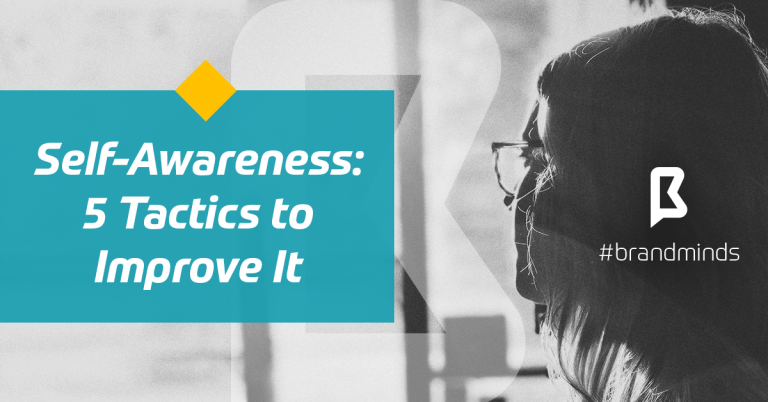In our previous article – Become a better leader through self-awareness – we presented the findings of a 2018 study conducted by Dr Tasha Eurich, an organisational psychologist and executive coach.

In this article, we are going to take a more hands-on approach to self-awareness and help you discover 5 tactics to improve it.
If you are looking to enhance your personal and professional life, whether you are part of a team or leading one or you’re just setting out to grow and develop as an individual, this article is for you.

1. Monitor your self-talk
Your self-talk combines your conscious thoughts with your unconscious beliefs and biases. It’s an effective way for your brain to interpret and process your daily experiences.
psychologytoday.com
What is self-talk?
Self-talk is your inner voice. Your self-talk is with you the moment you wake up in the morning until you surrender yourself to sleep at night. So it’s important to be aware of what your inner voice is telling you.
Talk to yourself like you would to someone you love.
Brene Brown
Is your self-talk positive or negative?
According to the Laboratory of Neuroimaging at the University of Southern California, a person has seventy thousand thoughts per day. How many of these thoughts are about you? Are they positive or negative? Do you hear criticism? Do you tell yourself you can’t do something, that you’re stupid or that you’re not good enough? If you do, know you have negative self-talk and you need to work on yourself to change it. As it turns out, 70% of people experience negative thoughts so you are not alone.
Researching self-talk, psychologists have found that our inner voice is more complex than breaking it into positive or negative.
Bob Stahl PhD, founder of several Mindfulness-Based Stress Reduction programs and author of 5 mindfulness books, writes about 4 categories of self-talk:
1.Catastrophizing
The catastrophe self-talk plays the worst-case scenario of the future.
It is about worrying: What if this happens? What if that happens? These thoughts amplify anxiety and depression.
2. Blaming
The I am to blame or It’s their fault is another type of self-talk, quite common.
Bob Stahl calls it a mind trap: holding ourselves responsible for another’s pain or holding others responsible for our pain. The problem here is that when you perceive the issue as lying outside of you, you give your power away to effect change.
3. Rehashing
Are you familiar with the saying You can’t undo the past?
For some of us, knowing there is nothing you can do to change the past is comforting and we don’t delve into it. Others are literally tormented by what happened in the past and go over it again and again in an effort to figure something out. The result is a constant state of pain and anguish.
4. Rehearsing
If we’re not concerned about the past, we’re concerned about the future.
Although the future hasn’t happened yet, some of us keep thinking about some future event, playing in their minds the possible ways it may unfold. Same as rehashing, rehearsing is equally painful and debilitating.
Mark Twain said, “I’ve had a lot of worries in my life most of which never happened.” Whatever you worry about, you need to acknowledge the fact that you don’t have control over the future. Instead of worrying, trust your abilities and character – it’s the power within you that will help you deal with any challenges the future might bring.

2. Identify your emotional triggers
You’ve been criticizing yourself for years, and it hasn’t worked. Try approving of yourself and see what happens.
Louise Hay
Emotional triggers are responses to old pains and sufferings. Psychologists call them emotional traumas which we experienced in our childhood and now are coming back to haunt us as adults because we haven’t healed them yet. In action movies there’s always this scene: the villain has caught the hero and he is torturing him by pressing on his open wound. Unlike the hero, we may not be aware that we are suffering from an open emotional wound, which leaves us vulnerable to life’s blows.
Dealing with your emotional triggers is a process. The first step is identifying them.
I feel angry when my partner criticizes me – why?
I feel less worthy when my colleagues don’t take my opinions into account – why?
Once you discover your triggers (by yourself or with the help of a therapist), you can begin to heal.
Self-compassion is one of the tools you can use in your healing process. Self-compassion is defined as the way to relate to self with kindness.
Learn to practices kindness and compassion towards yourself every day. Research has shown a positive correlation between self-compassion and psychological well-being.
Here is how you can practice self-compassion:
- Treat yourself as you would a small child;
- Practice mindfulness;
- Remember that you’re not alone;
- Give yourself permission to be imperfect;
- Work with a supportive therapist or coach.

3. Reframe your thoughts
Brain chemistry adjusts the composition of the blood based upon your perceptions of life. So this means that your perception of any given thing, at any given moment, can influence the brain chemistry, which, in turn, affects the environment where your cells reside and controls their fate. In other words, your thoughts and perceptions have a direct and overwhelmingly significant effect on cells.
Dr. Bruce Lipton, author Biology of Belief
If you think of yourself as being a loser, or ugly, or unworthy of love or success, you are setting yourself up for low confidence and low self-esteem. When you think low of yourself, you set yourself up for unhappiness: you won’t have the energy to take on life’s challenges, you won’t grow and develop your innate skills etc.
Our thoughts have power. Your thoughts create your reality.
I’m sure you came across these sentences before. You may think they are nice words but you don’t actually believe what they say. Well, scientists have found evidence suggesting they are also true. Changing or reframing your thoughts is possible – it’s called neuroplasticity.
Neuroplasticity is the brain’s ability to change and reorganise itself to create new connections between brain cells. That’s how positive thinking is formed and how bad habits can be turned into healthy habits.
Do you self-blame? Are most of your thoughts self-critical?
If you want to reframe your negative thoughts, Deepak Chopra teaches us to learn to differentiate reality from our disempowering interpretation of it, by asking the following questions:
Is it true 100%?
What is it costing you to hold this disempowering interpretation?
What is an empowering interpretation I would rather focus on instead?

4. Practise mindfulness
Mindfulness is the basic human ability to be fully present, aware of where we are and what we’re doing, and not overly reactive or overwhelmed by what’s going on around us.
mindful.org
What are the benefits of practising mindfulness?
Several scientific studies have found that our body and mind benefit galore from mindfulness:
- An enhanced immune function which results in improved physical health;
- Activation of the parts of the brain correlated to positive emotion which leads to greater happiness;
- Growth in higher-functioning regions of the brain like focused attention;
- Protection against age-related DNA damage;
- Overall mental health improvement.
Is mindfulness beneficial to leaders? Does mindfulness improve leadership?
Dr Mathew Lippincott, an expert on organisational leadership, Emotional Intelligence and mindfulness has examined the impact of mindfulness on leadership effectiveness.
Here are the key results of his research:
- Mindfulness enhances cognitive function and recognition of how emotions influence mental performance and behaviours;
- 98% of participants described a transformation of their fundamental understanding of what effective leadership is;
- 79% of participants reported stronger interpersonal relationships resulting from greater authenticity, honesty, and vulnerability in their interactions with others;
- Leadership effectiveness may be achieved more quickly and with a higher rate of success through the incorporation of formal mindfulness training.

5. Know your own worth
I have come to realize that in life, we don’t always get what we want because we only pursue what we think we deserve. That’s why it’s crucial that we believe in ourselves and see ourselves as enough and worthy of the best things life has to offer.
Sara Fabian, women empowerment coach
Do you often think you don’t deserve all you have achieved in life?
Or that it was only by luck that you got your great job?
If you do, you may not know your own worth.
Here’s how to improve your self-worth according to Sara Fabian, Women Empowerment Coach:
- Stop focusing on your weaknesses, flaws, and imperfections without being aware of your natural strengths, gifts, and talents;
- Stop fighting for perfection; perfection is an illusion of the mind, it doesn’t exist;
- Stop punishing yourself for every mistake you make;
- Acknowledge the hard work and efforts behind your achievements instead of attributing your accomplishments to luck or other people who gave you chances to succeed;
- Start being aware of the value you bring to your employers with your personal set of skills and abilities;
- Stop being a people-pleaser, your time means life and it’s never coming back.






















